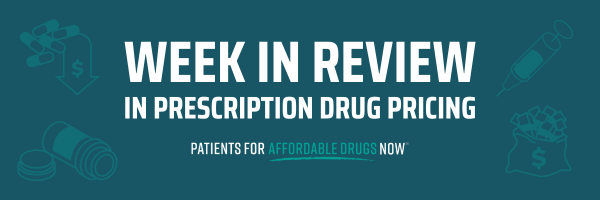
A lovely recognition from Washingtonian (and on his 73rd birthday!?) of our founder David Mitchell who was an “integral player in forcing the prescription-drug provision into the Inflation Reduction Act.” Congrats, David! Well deserved.
Welcome To The Week In Review.
1. Dozens Of Organizations Pressure Senate To Lower Drug Prices
- Over 40 organizations sent a letter to the Senate urging them to advance a package of bipartisan legislation this year to lower drug prices through increased competition, transparency, and accountability. The organizations — representing patients, consumers, seniors, churches, students, and disease advocacy groups — united in insisting senators focus on strengthening the U.S. patent and regulatory systems, increasing competition, and addressing the shady practices of Pharmacy Benefit Managers (PBMs) to ensure they are serving patients first. “There is bipartisan support in Congress to pass common-sense reforms that will further improve the U.S. drug pricing system and lower prices for more patients,” said P4ADNow’s David Mitchell. AARP, who co-led the letter with P4ADNow, emphasized: “More than 80 percent of voters across party lines want federal agencies such as the Food and Drug Administration to encourage more competition in the prescription drug marketplace.” There is clearly bipartisan momentum to pass meaningful drug price reforms this year. Next week, the Senate Health, Education, Labor and Pensions (HELP) Committee will hold two hearings — one with CEOs from insulin manufacturers and PBMs and another to mark up bipartisan legislation to close loopholes in the regulatory system and accelerate generic competition. We urge the 118th Senate to keep up the good work and prioritize advancing a package of bills to the Senate floor to lower drug prices for patients. — (P4ADNow, AARP, Bloomberg)
2. More Inflation Reduction Act Savings For Patients — “It’s huge.”
- Patients are seeing savings thanks to the drug price reforms in the Inflation Reduction Act. More than 37,000 Tennesseans will benefit from the $2,000 out-of-pocket cost cap when it takes effect in 2025 and many West Virginians on Medicare are better able “to buy groceries, and pay their rent and utility bills” due to the $35 monthly insulin copay caps. Members of the Biden administration continued to share how the new historic drug price law is helping patients. “Well, as you know, we pay the highest drug cost of any advanced nation in the world … but now we reduced the cost of insulin from hundreds of dollars a month to $35 a month — for anyone on Medicare,” remarked President Biden at a Democratic National Committee (DNC) reception. Vice President Kamala Harris echoed similar sentiments, saying “we were able to cap the cost of insulin for seniors at $35 a month. It’s huge.” Department of Health and Human Services (HHS) Secretary Xavier Becerra and Congresswoman Jennifer Wexton toured a senior living center in Virginia and touted the legislation, which will save Virginians who receive insulin through Medicare more than $500 per year. Becerra laid out the sizable impact of the new drug price law for American families: “The Inflation Reduction Act has now made it possible for families to be able to afford a lot of that health care that sometimes can cost a lot of money.” — (Citizen Tribune, Public News Service, The White House, The White House, Inside Nova)
3. Big Pharma’s Greed Knows No End
- New numbers show that Big Pharma unsurprisingly has been cashing out on advertisements, lobbying spending, patent abuses, and huge CEO salaries. The pharma industry spent nearly $8.1 billion on ads in 2022 while patients struggled to afford life-saving medications. Health industry lobbying far outpaced any other sector with The Pharmaceutical Research and Manufacturers of America (PhRMA) spending over $8 million in the first quarter of the year. Big Pharma CEOs took home eye-bulging amounts of pay: In 2022, Biogen CEO Chris Viehbacher was compensated $30.5 million and Moderna CEO Stéphane Bancel made nearly $400 million from stock options (not to mention he raised his salary by 50% to $1.5 million). Meanwhile, Moderna announced this week that its updated mRNA COVID-19 vaccine will be priced up to $130 per shot — looks like Bancel plans to continue profiting off the backs of taxpayer funded research. Speaking of taxpayer dollars, a new study in Health Affairs shows that the U.S. government spent $143 million towards development and clinical testing of Truvada, the first approved HIV prevention pill. Yet drugmaker Gilead has hiked the price by more than 40% and made as much as $3 billion annually off the taxpayer-supported drug. Gilead’s trial — in which the federal government is suing Gilead for infringement on government-owned patents — began this week. While drug companies claim that high drug prices are needed to justify research and development, the truth is they simply want to line their coffers with more and more profit. (Fierce Pharma, Open Secrets, Fierce Pharma, Washington Post, Ars Technica, Health Affairs, Endpoints)
BONUS: Florida patient advocate Xanadu Roque eloquently speaks about her experience growing up with type 1 diabetes, issues with accessing insulin in her community, and the growing pressure from advocates to lower insulin prices. Check it out!
Have a great weekend, everyone!
